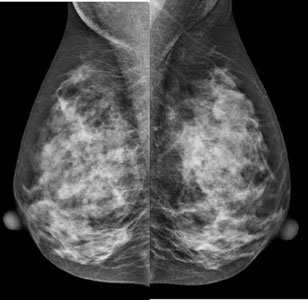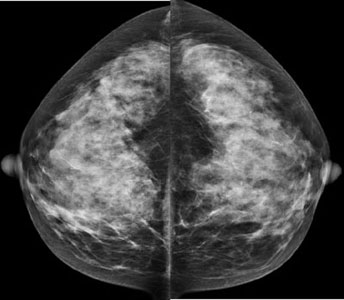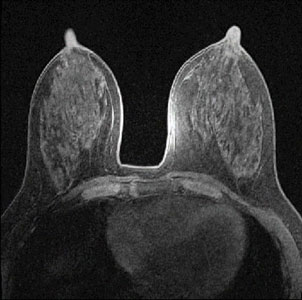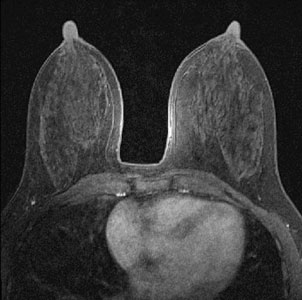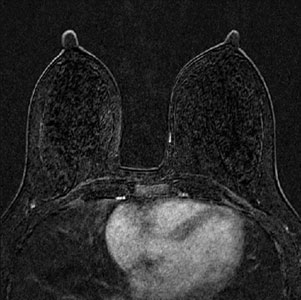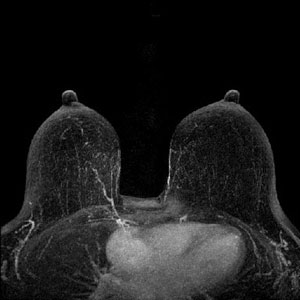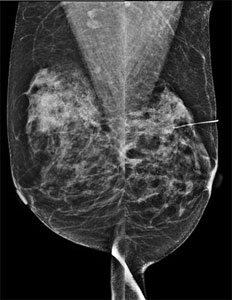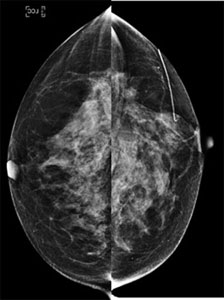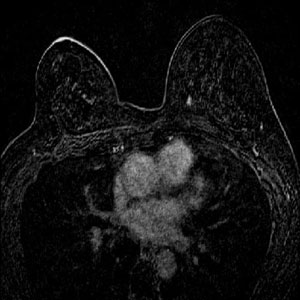Abbreviated Screening Breast MRI: Improving cancer detection in women with dense breast tissue
Triad Radiology Associates and Novant Health Imaging Maplewood are pleased to announce a new supplemental breast cancer screening option for women with dense breast tissue: Abbreviated Screening Breast MRI (ASBMRI). Although screening mammography is instrumental in reducing deaths due to breast cancer, mammography can miss some breast cancers─particularly in women with mammographically dense (“heterogeneously or extremely dense”) breast tissue. ASBMRI is especially beneficial for these patients. North Carolina, along with more than 20 other states, now requires notification of breast tissue density and suggests that these patients talk to their doctor about supplemental screening due to reduced ability of screening mammography to detect cancer.
What are the risks of having dense breast tissue?
There is a higher risk of breast cancer in women with dense breast tissue as compared to similar women with less dense breast tissue. There is also a higher risk of developing more aggressive breast cancers in such women. Because dense breast tissue can obscure the ability to see a breast cancer mammographically, there is reduced early detection potential with screening mammography. There is also a higher likelihood that a breast cancer will have spread to lymph nodes by the time it is detected mammographically or by physical or self breast examination.
Screening mammogram of a woman with dense breast tissue
What is ASBMRI?
Breast MRI has been shown to detect more cancers at a smaller size and a higher rate of detection before spread to lymph nodes. Breast MRI detects cancer differently than ultrasound and mammography, which rely on physical changes in architecture or density. The ability of breast MRI to detect cancers is based on tumor-related biological changes that cause blood vessel alterations and inflammation from biochemicals created by tumor cells. Breast MRI can detect tumors independent of the degree of tissue density by depicting alterations in contrast enhancement of intravenously administered contrast. ASBMRI offers the superior sensitivity of MRI for breast cancer detection, but is performed in ten minutes or less and for a fraction of the price of a traditional standard breast MRI.
ASBMRI images of the same woman in the above screening mammogram. Images are taken before and after an injection of intravenous contrast.
ASBMRI images are processed by digitally subtracting the before contrast images from the post-contrast images, which “removes” the normal dense breast tissue. This creates multiple 2-dimensional images and a 3-dimensional image of the breasts, which allows the radiologist to “see thru” the dense breast tissue.
Mammogram images showing breasts with dense tissue. Subsequent ASBMRI image showing a small 7mm breast cancer (small bright spot located along the inner portion of the breast on the right side of the image) that is not detectable on the mammogram.
How do I know if ASBMRI is right for me?
ASBMRI may be an appropriate supplemental (i.e. in addition to screening mammography) screening exam for breast cancer if you have dense breast tissue. Dense breast tissue includes breast tissue characertized mammographically as “heterogeneously dense” or “extremely dense.” Breast density will be reported on the letter you receive after undergoing screening mammography. Your doctor also receives a screening mammography report from the radiologist that includes an estimation of breast density, so he or she can also help determine if you are a candidate for ASBMRI.
Is there exposure to X-rays or radiation with ASBMRI?
There is no radiation involved in the use of any MRI. MRI uses strong magnetic fields and radio frequency pulsations to create images of the body.
Is ASBMRI painful?
The examination is painless. There is no compression of the breast as is necessary for mammography. The patient lies face down on the MRI exam table and care is given by the technologist to ensure patient comfort. Earplugs are placed to dampen the noise created by the MRI machine. Prior to the exam, an i.v. is placed in the arm to allow intravenous injection of contrast.
How and where can I schedule an appointment for ASBMRI?
ASBMRI is offered at Novant Health Maplewood Imaging Clinic in Winston-Salem. We ask that you obtain a referral from your physician. Appointments can be scheduled by calling 336-397-6033.

